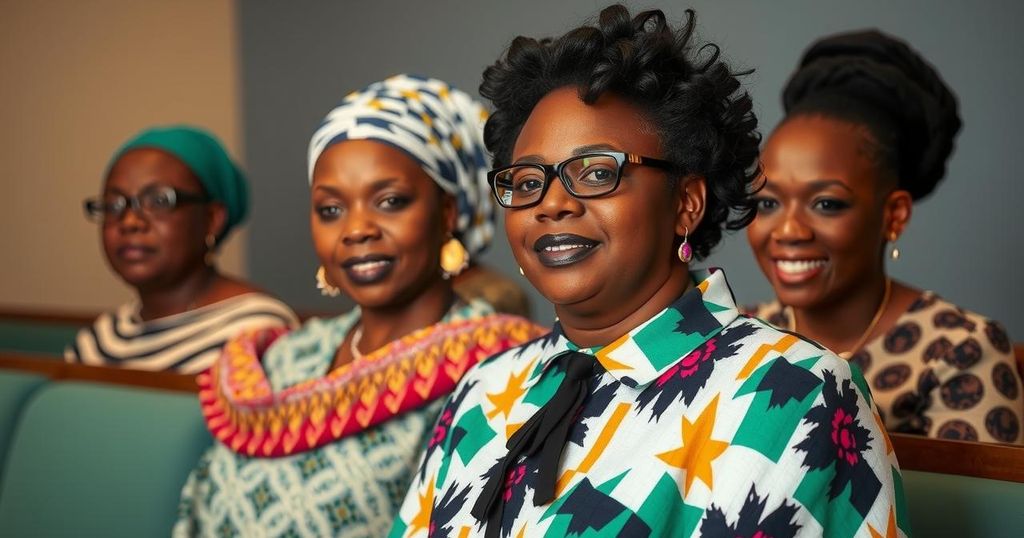Enhancing Women’s Representation in Botswana’s Parliament: A Call for Inclusion
Botswana faces a critical challenge regarding women’s representation in parliament, with only 28 women candidates out of 258 in recent elections, leading to a mere 4.92% in legislative seats. Despite women constituting 54% of eligible voters, their power and visibility in decision-making remain low. Political parties are urged to reform candidate selection processes to ensure gender parity in governance as Botswana approaches the 2024 elections.
Recent discussions in Botswana’s political landscape have revolved around the pressing query: “bomme ba kae?” or “where are the women?” This question has taken on heightened significance in the lead-up to the 2024 general elections. Despite women comprising 54% of the eligible electorate, their representation in parliament is alarmingly low. Out of 258 candidates in the last elections, only 28 were women, resulting in a mere 10.85%, and only three secured seats, which corresponds to 4.92% of the total 61 seats. This figure marks a decline from the prior elections’ statistic of 5.26%. With such striking disparities, it is imperative for political parties in Botswana to reflect on their internal structures and candidate selection processes to foster inclusive and representative governance.
In the context of Botswana, where gender inequities are prevalent in political representation, the importance of women’s inclusion cannot be overstated. The Southern African Development Community introduced a gender checklist in 2002, aimed at promoting gender equality in elections across the region. However, despite these institutional efforts, many countries, including Botswana, still fall short in ensuring meaningful participation of women in politics. The discrepancy between the number of eligible female voters and those actually represented in government underscores the need for political parties to advocate for women’s rights and address systematic barriers that impede female candidacies.
Botswana’s political parties must reassess their internal practices regarding the nomination of candidates and strive for gender parity to build more inclusive democratic institutions. The lack of women’s representation not only stagnates progress toward equality but also undermines the voices and needs of half the population in policy-making processes. By embracing diverse leadership, political parties can contribute to a more equitable society that recognizes and values the contributions of women in governance.
In summary, the representation of women in Botswana’s parliament remains woefully inadequate despite the significant percentage of female voters. Addressing this gender gap is crucial if political parties wish to transform into genuinely inclusive institutions. Adequate measures must be taken to promote women’s participation and rectify the disparities that currently exist in political representation. Only with increased commitment to gender equality will Botswana flourish as a truly democratic society where all voices are heard and represented.
The issue of women’s representation in Botswana’s parliament is critical, particularly as the country prepares for its upcoming general elections in 2024. Historically, political representation has been male-dominated, despite women representing a majority of registered voters. The challenges to gender parity in political spaces are long-standing, underscored by the unfortunate statistics of female candidacy and selection. The Southern African Development Community’s previous initiatives reflect a regional awareness of the need for gender equity in political systems, yet the outcomes have been less than satisfactory in practice. This landscape necessitates a fundamental shift within political parties to prioritize gender inclusivity, thereby meeting democratic ideals and effectively serving the electorate. This context highlights the need for an ongoing conversation and action plan aimed at promoting women’s representation in all layers of governance.
In conclusion, the under-representation of women in Botswana’s parliament highlights a significant barrier to achieving true democratic representation. Political parties must take proactive measures to include women in their ranks and prioritize equitable candidate selection. Addressing these disparities is essential not only for the advancement of gender equality but also for the overall health of Botswana’s democracy. By fostering an inclusive political landscape, Botswana will enhance the effectiveness and responsiveness of its governance, ultimately benefiting the entire society.
Original Source: constitutionnet.org




Post Comment